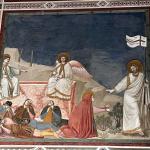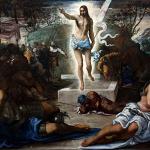Part 2: A Dogmatica Minora
Section 1: Trinity
Hart ended the previous section emphasizing that Christianity offers a story of the infinite that is also, contrary to all paganism, a story of beauty. To fill out this Christian narrative of infinite beauty, Hart focuses on the Nicene-Constantinopolitan creed as ?the most elementary and binding canon of catholic confession?E(p. 153), examining four specific issues in that creed: Trinity, creation, salvation, and eschatology. He organizes each of these moments by a series of theses, which offer ?a series of interrelated but also somewhat independent interpretive vantages upon the essential matter?E(p. 154). Through these theses, he presents the argument that ?to speak of the beauty of the infinite [as opposed to the infinity of beauty ?Ewhich might be a sentimental exaggeration] is genuinely to name the Christian difference in aesthetics, a thought of the beautiful inconceivable to non-Christian philosophy, ancient and modern alike?E(p. 154).
I.i. Trinity: Divine Apatheia.
The thesis for this section states that the Christian understanding of beauty is a necessary emergence from the claim that God is a Triune perichoresis, ?whose life is eternally one of shared regard, delight, fellowship, feasting, and joy?E(p. 155). Hart begins the section on apatheia by referring to the Rahner?s rule, namely, that the economic Trinity is the immanent Trinity and vice versa, pointing out that the revival of Trinitarian theology does not mark a resurgence of ?scholastic?Eabstraction but a renewed interest in the historical particularities of Christian faith. Liberalism by contrast was impelled by abstraction, moralization, and spiritualization, and the turn to Trinitarian theology is necessarily a postliberal recognition in which ?the salvific significance of Christ?s historical specificity has been to some considerable degree recovered from the confining prejudices of modern thought?E(p. 156). The doctrine is simply a theological interpretation of salvation and salvation history. Any separation of Trinity from the specific narrative of Jesus impoverishes both theology and narrative.
Rahner?s rule is, however, subject to two temptations. The first, which Hart examines in this section, is a theological Hegelianism that obliterates any distinction of history and theology, any distinction of immanent and economic. Hart?s main interlocutor here is Robert Jenson, and he states his thesis clearly at the outset: ?If the identity of the immanent Trinity with the economic is taken to mean that history is the theater within which God ?Eas absolute mind, or process, or divine event ?Efinds or determines himself as God, there can be no way of convincingly avoiding the conclusion (however vigorously the theologian might deny the implication) that God depends upon creation to be God and that creation exists by necessary (because of some lack in God), so that God is robbed of his true transcendence and creation of its true gratuity?E(p. 157). If God is locked in interdependence with the creation, then Christian becomes another story of necessity (which Hart has critiqued in an earlier section) and the ground of Christian aesthetics is lost. Without the doctrine of apatheia, the doctrine that God is perfectly God and perfectly beautiful and joyful and infinitely satisfied without creation, there is no distinctive Christian aesthetic: ?God is good and sovereign and wholly beautiful, and creation is gift, loveliness, pleasure, dignity, and freedom, which is to say that God is possessed of that loveliest (and most widely misunderstood) ?attribute,?Eapatheia?E(p. 157).
Needless to say, in the current theological climate (can you say ?Moltmann?E), showing that apatheia is ?lovely?Eis a tall order. Hart begins the argument by pointing out that God has no need of His creation, and need not be our God, because ?all we are, all we can ever become, is already infinitely and fully present in the inexhaustible beauty, liveliness, and ?virtue?Eof the Logos, where ?Eas the infinitely perfect reflection of the divine essence that flows forth from the Father, fully enjoyed in the light of the Spirit ?Eit is present already as responsiveness and communion?E(p. 158). God loved and knew us before we were, loved and knew us, as He now loves and knows us, in the Son. This ?freedom of God from ontic determination?Eis not a piece of Hellenizing, but the basis for creation?s goodness and beauty: ?precisely because creation is needless, an object of delight that shares God?s love without contributing anything that God does not already possess in infinite eminence, creation reflects the divine life, which is one of delight and fellowship?E(p. 158). Or, ?in being the object of God?s love without any cause but the generosity of that love, creation reflects in its beauty that eternal delight that is the divine perichoresis and that obeys no necessity but divine love itself?E(p. 158). Further, Hart points out that the misreading of Rahner?s Rule that he is dealing with does damage to the infinity of God, and specifically suggests that God?s will might be, as it is with all finite beings, other than his being. Since God is infinite, will and being are one, and thus His will to create manifests His being, His beauty (p. 159). If God is simply a finite being, there might be some gap between His will and the products of His will, and His being. This is a profoundly important point: To make God dependent on the creation damages the Christian doctrine of God; but, equally, to make God dependent on the creation damages the Christian doctrine of creation.
Hart notes that in some cases the desire for a suffering God is a desire to escape God as judge by making him co-sufferer. We may be sinners, sure, but God does sympathize, and thus we have to some degree a valid perspective, one that God should and does acknowledge. In certain of its forms, however, the impetus behind the assault on apatheia is tempting. Hegelianized theology is an effort to weed Hellenistic metaphysics out of the biblical idea of a narrated God who reveals Himself in history, including the history of the cross. Hart argues, though, that the Christian narrative arises precisely from the double affirmation of divine apatheia and the story of the cross; if the cross is some necessary stage in God?s self-realization, it is not an act of utter and bottomless grace. Further, contrary to intentions, a God who suffers with us becomes ?the metaphysical ground of Auschwitz?E(p. 160). For if God realizes His identity by identification with our suffering, suffering itself becomes necessary. The problems of collapsing the ontological into the economic are, Hart says, moral as much as they are metaphysical.
Hart spends a number of pages examining the work of Robert Jenson, who attempts to make a case for ?an essential narrativity in the identity of God?E(p. 160) without falling into the traps of Hegelianism. On Hart?s reading, Jenson does not succeed. Jenson says that God has determined from eternity that He will be the God He is in relation to Jesus, and thus the Father finds His identity as God as He, with the Son and Spirit, confront ?the horizon of death?Eand overcome it (p. 160). Thus, the cross and resurrection of Jesus are the moment of God?s self-transcendence. The Son?s preexistence consists of His presence to the Father as the Father?s ?eternally will Logos?E God chose to be united to Jesus, and this choice is His being. Thus, the suffering of the Son is a suffering within the Father, a taking up of the suffering of the creation (who the Son is) into the Triune life. According to Jenson, however, God would remain the same God without the creation; but we can never say exactly how this is so.
Hart disputes the last point: ?it is simply prima facie false that if God achieves his identity in the manner Jenson describes, he could have been the same God by other means, without the world: (p. 162). If history determines the ide
ntity of God, God could not be the particular God He is without this particular history. Jenson introduces a voluntarist moment in his account intended to protect the freedom and sovereignty of God: God chooses, freely, to define Himself in terms of Jesus and not in any other way. But this leaves God?s identity bound to the conditions He elects. Nor can Jenson escape the logic of this by saying that Jesus is the ?one historical object?Ein which ?absolute consciousness?Ediscovers its ?meaning and self?E(Jenson?s wording). If God has chosen to be, to define himself, in relation to Jesus, His identity is also inseparable ?from the entire order of contingencies that Jesus inhabits?E(p. 163). Jenson?s effort to make a ?small but drastic amendment?Eto the Hegelian scheme doesn?t really change the scheme. The distinction of being and becoming can be overcome only through collapsing the two, so that being is an infinite becoming. But this makes God a being, ontic rather than ontological, a God who can potentially become the God He elects to be. (Hart also notes that Jenson?s formulations appear to posit ?some sort of deliberating identity to the Father prior to the delimiting empirical object in which he ?finds?Ehimself?E?Ethus, from another direction, Jenson?s Trinity threatens to collapse into modalism.)
And this means further that all the tragic consequences of Jesus as well as the preconditions of Jesus?Eexistence become necessary to the identity of God (p. 164). God must intend sin and evil as part of His becoming the God He chooses to become. And this in turn means that what good God has is not good itself but a reaction to evil. This God is a God of sacrifice and stoicism, a God who failed Ivan Karamazov?s test about constructing a world whose happiness depends on the suffering of one innocent child. Any consciousness that is determined in a finite object, as in Jenson?s theology, is itself finite. God?s story thus becomes not a story of good and evil. Thus the collapse of immanent and ontological turns God into the truth of our suffering, rather than the sovereign, free, and infinite Savior. Jenson ultimately gives us a dialectical rather than a transcendent Trinity. A God who ?acquires determinations?Eand is becoming is not God but ?a god?E(p. 166), the supreme being among beings.
And these moves are wholly unnecessary to achieve the aim of providing the world with a vision of a compassionate God. If you want a God who is infinitely near us in suffering, He has to be transcendent. A God who is locked in the process of being and does not transcend created limits utterly is not capable of being nearer to us than we are to ourselves, and such a God can only move us from without and not change us from within. Only if God transcends all boundaries can He cross the boundary of my person and dwell in me through His Spirit.
(A question: Hart is clearly here attacking not just Jenson?s Hegelian supralapsarianism, but all forms of decretal theology. What would the picture look like if we affirmed, with classic Reformed theology, but the apatheia of God and His universal decree? Would this position be able to respond to Hart?s challenge?)
Hart is quick to admit that Jenson does not intend any of these consequences, but he suggests that contemporary theologians have both failed to grasp the Christian tradition and to think through the proposed alternatives. Hart argues (conclusively in my view) that apatheia in the sense that he describes it is necessary if we are to insist on the biblical story of creation and redemption. Because God loved us when we were not, He is capable of showing mercy and He can overcome all suffering. Hart suggests that this is true in two senses: First, because love is not first of all a reaction but the ontological possibility of all ontic action, the ?primordial generosity that is convertible with being itself, the blissful and desiring apatheia that requires no pathos to evoke it, no evil to make it good?E(pp. 166-167). That is, God?s goodness and love is wholly and purely love because it does not respond to some prior evil that it seeks to overcome. Pathos, he suggests, is definitionally ?a finite instance of change visited upon a passive subject, actualizing some potential?E(p. 167), but God?s love is purely positive and purely active. Second, ?God?s infinitely accomplished life of love is that trintarian movement of his being that is infinitely determinate ?Eas determinacy toward the other ?Eand so an indestructible actus purus endlessly more dynamic than any mere motion of change could ever be?E(p. 167). The cross does manifest God?s love, but doesn?t determine its nature; it manifests a primordial Trinitarian outpouring that ?always already surpasses every abyss of godforsakenness and pain?E(p. 167).
Hart offers, in closing the section, a definition of apatheia: ?God?s impassibility is the utter fullness of an infinite dynamism, the absolutely complete and replete generation of the Son and the process of the Spirit from the Father, the infinite ?drama?Eof God?s joyous act of out-pouring ?Ewhich is his being as God.?EWithin this eternal and infinite act of being, there is no negation, no reaction, no pathos, no evil. ?His love is an infinite peace and so needs no violence to shape it, no death over which to triumph.?E Yet, this is not ?some kind of original unresponsiveness in the divine nature; it is divine beauty, that perfect joy in the other by which God is God: the Father?s delectatio in the beauty of his eternal Image, the Spirit as the light and joy and sweetness of that knowledge?E(p. 167).
This goes, I think, a long way to demonstrating that apatheia is the ?loveliest?Eof God?s attributes.















